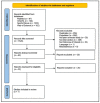Exploring the Nutrition Strategies Employed by Ultra-Endurance Athletes to Alleviate Exercise-Induced Gastrointestinal Symptoms-A Systematic Review
- PMID: 37892406
- PMCID: PMC10610183
- DOI: 10.3390/nu15204330
Exploring the Nutrition Strategies Employed by Ultra-Endurance Athletes to Alleviate Exercise-Induced Gastrointestinal Symptoms-A Systematic Review
Abstract
(1) Background: Participation in ultra-endurance sports, particularly ultra-running, has increased over the previous three decades. These are accompanied by high energetic demands, which may be further exacerbated by extreme environmental conditions. Preparation is long-term, comprising of sufficient exercise management, supportive dietary habits, and nutritional intakes for optimal adaptations. Gastrointestinal symptoms are often cited as causing underperformance and incompletion of events. Though the majority do not pose serious long-term health risks, they may still arise. It has been suggested that the nutritional interventions employed by such athletes prior to, during, and after exercise have the potential to alter symptom incidence, severity, and duration. A summary of such interventions does not yet exist, making it difficult for relevant personnel to develop recommendations that simultaneously improve athletic performance by attenuating gastrointestinal symptoms. The aim of this research is to systematically review the literature investigating the effects of a nutrition intervention on ultra-endurance athletes exercise-induced gastrointestinal symptom incidence, severity, or duration. (2) Methods: A systematic review of the literature was conducted (PubMed, CINAHL, Web of Science, and Sports Discus) in January 2023 to investigate the effects of various nutrition interventions on ultra-endurance athletes' (regardless of irritable bowel syndrome diagnosis) exercise-induced gastrointestinal symptoms. Variations of key words such as "ultra-endurance", "gastrointestinal", and "nutrition" were searched. The risk of bias in each paper was assessed using the ADA quality criteria checklist. (3) Results: Of the seven eligible studies, one was a single field-based case study, while the majority employed a crossover intervention design. A total of n = 105 participants (n = 50 male; n = 55 female) were included in this review. Practicing a diet low in short-chain, poorly absorbed carbohydrates, known as fermentable oligosaccharides, disaccharides, monosaccharides, and polyols (FODMAPs), as well as employing repetitive gut challenges of carbohydrates, remain the most promising of strategies for exercise-induced gastrointestinal symptom management. (4) Conclusion: Avoiding high-FODMAP foods and practicing repetitive gut challenges are promising methods to manage gastrointestinal symptoms. However, sample sizes are often small and lack supportive power calculations.
Keywords: exercise; gastrointestinal; intervention; nutrition; symptoms; ultra-endurance.
Conflict of interest statement
The authors declare that the research was conducted in the absence of any commercial or financial relationships that could be construed as a potential conflict of interest.
Figures
References
-
- Hawley J.A., Hopkins W.G. Aerobic glycolytic and aerobic lipolytic power systems. A new paradigm with implications for endurance and ultraendurance events. Sports Med. 1995;19:240–250. - PubMed
Publication types
MeSH terms
Substances
LinkOut - more resources
Full Text Sources
Research Materials


